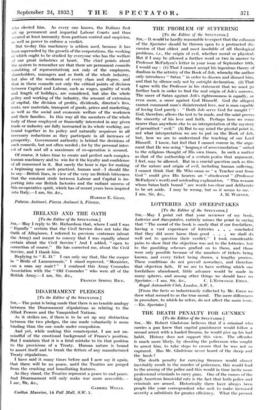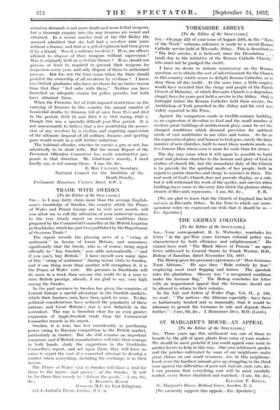THE DEATH PENALTY FOR GUNMEN
• [To the Editor of the SPECTATOR.]
SIR,—Mr. Robert Gladstone believes that if a criminal who carries a gun knew that capital punishment would follow a second arrest with a loaded firearm, lie would give up his bad habit. History does not support this view. The offender is much more likely, by shooting the policeman who sought to arrest him, to take steps to ensure that lie wasnot so captured. Has Mr. Gladstone never heard of the sheep and the lamb ?
The death penalty for carrying firearms would almost inevitably result in the murder of policemen, this would lead to the arming of the police and this would in time incite more professional criminals to carry guns. One of the causes of the high American homicidal rate is the fact that both police and criminals are. armed. Historically there have always been people like your correspondent who seek to make increased severity a substitute for greater efficiency. What the present situation demur& is not more death and more lethal weapons, but a thorough enquiry into the way firearms are issued and obtained. In a recent murder trial at the Old Bailey the accused admitted that she had had a revolver nine years without a licence, and that as a girl of eighteen had been given it by a friend. Was it a military revolver ? If so, are officers allowed to dispose of their weapons without supervision ? Was it originally held on a civilian licence ? If so, should not persons at least be required to present their weapons for inspection every year, and only dispose of them to authorized persons. But has not the time come when the State should prohibit the ownership of all revolvers by civilians ? I know two Oxford graduates who have revolvers for no better reason than that they " feel safer with them." Neither can have furnished an adequate excuse for police permits, but both have obtained them.
When the Firearms Act of 1920 imposed restrictions on the carrying of firearms in this country the annual number of homicidal deaths by firearms fell at once from 27.3 and 25.2 in the periods 1508-13 and 1914-9 to 19.0 during 1920-5, though this was a specially difficult post-War period. It is not unreasonable to believe that a law prohibiting the posses- sion of any revolver by a civilian and requiring supervision of the ultimate disposal of all military firearms and sporting guns would result in a still further reduction.
The habitual offender, whether he carries a gun or not, has admittedly to be dealt with. But the recent Report of the Persistent Offenders Committee has made constructive pro- posals in that direction. Mr. Gladstone's remedy, I need hardly say, is not among them.—I am, Sir, &e., E. ROY CALVERT, Secretary, National Council for the Abolition of the Death Penalty.
Parliament Mansions, Victoria Street, S.W. 1.































 Previous page
Previous page